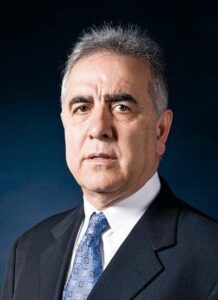Richard Mills, U.S. Ambassador to Armenia, spoke at the Western Prelacy in La Crescenta, California, on March 10, during his tour of Armenian communities throughout the United States to brief them on his diplomatic work in Armenia.
In his welcoming remarks, Archbishop Moushegh Mardirossian, Prelate of the Western Prelacy of the Armenian Apostolic Church, expressed the hope that “the United States, as a champion of justice and human rights, will in due time join the scores of nations that have formally acknowledged the indisputable truth of the Armenian Genocide.”
Amb. Mills spoke about the progress Armenia has made in the last two decades and presented the four priorities being pursued the U.S. Embassy:
1) deepening business and trade relations between Armenia and the United States;
2) countering corruption;
3) strengthening democracy, human rights, and civil society;
4) creating a better understanding of U.S. foreign policy goals.
The Ambassador explained that the United States encourages reconciliation between Armenia and Turkey by continuing to support the Protocols that were signed in 2009, but not ratified. Speaking of the Armenian Genocide Centennial, Amb. Mills remarked that “Armenians were massacred and marched to their deaths by the Ottoman Empire,” carefully avoiding the term ‘Armenian Genocide.’
At the end of the Ambassador’s presentation, I had the privilege of being called upon to ask the first question. I respectfully commented:
“I know that ambassadors don’t decide U.S. foreign policy. You are simply the messenger. I would like to go on record to say that it is deeply offensive to the Armenian community for you to come here and not use the word genocide to describe what happened to Armenians in 1915. I am not blaming you. It is not your fault! You know what happened and the U.S. government knows what happened. American officials have repeatedly recognized the Armenian Genocide since 1951. I have written a book that documents U.S. recognition of the Armenian Genocide which I will be happy to give you. It is not understandable to Armenians and non-Armenians around the world why the U.S. government is now reluctant to use a word that describes what it acknowledged a long time ago. This reluctance puts the United States at a disadvantage when its officials give lectures to Armenians in Armenia about democracy, morality and justice, and yet they fail to comply with their own principles. The U.S. government should be an example to the rest of the world! I am just using you as a messenger. I see that one of your colleagues from the State Department is here with you. I hope that you would transmit my message to your superiors in Washington.”
Amb. Mills gave the following brief answer: “My only response will be to reiterate Pres. Obama’s goal which he set forth in his statement on April 24th: ‘We want full, frank and just acknowledgment of what happened from the Turkish government and Turkish people.’”
Regrettably, the U.S. Ambassador was simply following Pres. Obama’s deplorable reluctance to utter the words ‘Armenian Genocide,’ despite his repeated promises to do so as a candidate.
Regardless of whether Pres. Obama and his underlings use the term genocide, the fact remains that the United States has repeatedly acknowledged the Armenian Genocide at the Presidential and Congressional levels.
Nevertheless, the Armenian-American community and Armenians worldwide have an obligation to confront and reject every attempt to minimize or distort the proper characterization of the Armenian Genocide. Remaining silent upon hearing such reprehensible terminology is an insult to the memory of the Armenian Martyrs, particularly when unacceptable euphemisms are uttered in Armenian church halls and community centers.
Amb. Mills was probably surprised by the adverse reaction of the audience to his statements not only regarding the Armenian Genocide, but also his faulty claim that Turkey was fighting against ISIS!
Unfortunately, we cannot expect every American Ambassador to sacrifice his/her diplomatic career by telling the truth to power as did John Evans, the former U.S. Ambassador to Armenia. He boldly acknowledged the Armenian Genocide at a great personal cost, during a similar tour of the Armenian communities in the United States.
Amb. Mills should be commended for his efforts to improve U.S.-Armenia relations. However, his superiors in Washington should be made aware that his good work is being undermined by their shameful word games regarding the Armenian Genocide!


